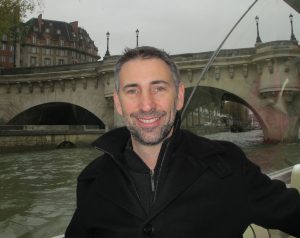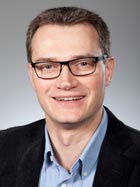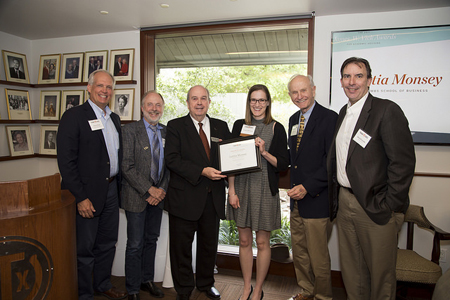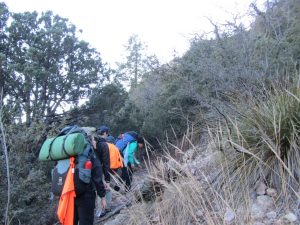 Like most BHP students, I started my career with a desire to achieve as much as possible. A 1991 BHP graduate, I started at Andersen Consulting (now Accenture) in 1992 after getting my MBA at McCombs. I worked at Accenture for 22 years, 12 as a partner in Accenture’s Strategy practice. Focusing on organization change, leadership, and employee engagement, I worked on some of Accenture’s largest global accounts at places like Exxon, Chevron, Cargill, and DuPont. Along the way, I enjoyed exciting work; fantastic teams; and the opportunity to be on the inside of some of the biggest companies in the world. I also earned 4 million airline miles, and though that sounds great, the travel began to take a toll on my health and well being.
Like most BHP students, I started my career with a desire to achieve as much as possible. A 1991 BHP graduate, I started at Andersen Consulting (now Accenture) in 1992 after getting my MBA at McCombs. I worked at Accenture for 22 years, 12 as a partner in Accenture’s Strategy practice. Focusing on organization change, leadership, and employee engagement, I worked on some of Accenture’s largest global accounts at places like Exxon, Chevron, Cargill, and DuPont. Along the way, I enjoyed exciting work; fantastic teams; and the opportunity to be on the inside of some of the biggest companies in the world. I also earned 4 million airline miles, and though that sounds great, the travel began to take a toll on my health and well being.
Time for a Change
The plan was never 22 years. Like most new consultants, I thought 2-3 years of experience across industries would give me a good idea on what I wanted to do next. As it turned out, I was too busy to figure out what to do after consulting. After preaching change management to my clients for two decades, it became clear that I needed to embrace change in my own life. So I walked away from consulting to start a sabbatical, and I did so without a plan!
So, Now What?
On March 12, 2014, I was unemployed for the first time since the Reagan Administration. Not surprisingly, I was a bit lost on what to do next. There was no new promotion to go after, no new client to win over, no important executive to network with. With none of the usual demands on my time. I was able to spend more time with my family and friends and to nurture some new interests.
When I left Accenture, my son was a 7th grader. After having missed way too many teacher conferences and school events due to business travel, I fully embraced being a stay-at-home dad. Making breakfast every morning, and cooking with my son in the evenings are memories that will stay with me forever. Even though he is about to be a high school junior, I am still the first 30 minutes of conversation after school each day. It is nice to be available at 3:30!
All this is great, but I still needed to figure out what to do with my time and energy. I considered any number of possibilities, from writing to teaching to opening my own coffee shop. As nothing seemed quite right, I decided to spend my time learning instead of stressing on what’s next (didn’t I leave work to avoid stress in the first place?).
First, I dusted off the French textbook from college and committed to learning a second language. Three years later, I am largely fluent, devouring French newspapers, movies, and novels. Despite all my business travel, I had rarely traveled internationally for leisure. With my new found language skills in tow, that quickly changed. With time for longer trips abroad (yes, I backpacked, no I did not stay at a youth hostel), I gained a deeper appreciation and study of European history, politics, art, and architecture. No longer worried about the next client, I can now be found tweeting on the French election instead. I have enjoyed the process of learning French so much, that I have recently began learning German as well.
The break from work also gave me more time to reconnect with the University. Now serving on the BHP Advisory Board, I enjoy the time I have spent talking to students and other alumni. It has served as a good reminder about how much I care about the University and how nice it is to connect to today’s BHP students. They are truly an impressive group of young people.
Second Act
Still in my forties with lots of energy, I have started a more active search for what’s next. Freed from concerns about the next promotion or the next deal, I am looking at opportunities differently than I did in my prior life. One of my favorite things about Accenture was working on globally diverse teams. Of all the I miss from my prior career, what I miss most is the opportunity to work with smart people from other countries, learning how they do things and what they value.
Given my preference for international work, and my new-found language skills, I have begun the process of networking in Europe with the goal of finding meaningful work there. Specifically would like to apply what I learned in the business world to education, teaching, and preparing future leaders. I’m not sure yet if that will lead me to a think tank in Paris, a classroom in Zurich, or the UN in Geneva, but, as I now live my life free of plans and expectations, I am happy to patiently wait to see what comes my way.
Like many BHP graduates, I left school looking to always have a plan and to be in control. Surprisingly, I have found that giving up control can actually lead to a more fulfilling life. I know not everyone can take multiple years off from work, but for those that can even take a short sabbatical, I highly recommend it – you never know where you may end up!

 After building relationships with The University of Texas during his first visit in 2012, visiting professor Jedrzej Bialkowski was invited by the Department of Finance to teach and conduct research at UT for the Spring 2017 semester. With his breadth of knowledge in research areas such as microstructures and market risk management, The McCombs School of Business is lucky to have Professor Bialkowski for the semester!
After building relationships with The University of Texas during his first visit in 2012, visiting professor Jedrzej Bialkowski was invited by the Department of Finance to teach and conduct research at UT for the Spring 2017 semester. With his breadth of knowledge in research areas such as microstructures and market risk management, The McCombs School of Business is lucky to have Professor Bialkowski for the semester!
 Laura Rosen, BHP 2004, is a Senior Policy Analyst and Outreach Coordinator for the Center for Public Policy Priorities, where she manages program strategy, advocacy, marketing and communications for their job quality and asset building work. Prior to joining the CPPP, Laura worked for Wells Fargo. She completed a master’s degree in public policy with a concentration in social enterprise and economic development from the University of Michigan’s Ford School of Public Policy.
Laura Rosen, BHP 2004, is a Senior Policy Analyst and Outreach Coordinator for the Center for Public Policy Priorities, where she manages program strategy, advocacy, marketing and communications for their job quality and asset building work. Prior to joining the CPPP, Laura worked for Wells Fargo. She completed a master’s degree in public policy with a concentration in social enterprise and economic development from the University of Michigan’s Ford School of Public Policy.
 The group loved the experience, and luckily there were no injuries or major setbacks during the week. “My favorite parts of the trip were being able to truly experience an unknown environment, getting to know everyone in BHP fully, and testing my boundaries,” said Maggie White, a BHP freshman. “I am so grateful that BHP gave me this opportunity to push myself to be a better person.”
The group loved the experience, and luckily there were no injuries or major setbacks during the week. “My favorite parts of the trip were being able to truly experience an unknown environment, getting to know everyone in BHP fully, and testing my boundaries,” said Maggie White, a BHP freshman. “I am so grateful that BHP gave me this opportunity to push myself to be a better person.” The whole group agreed that one of the best outcomes of the trip was that they all bonded. The students didn’t know each other well before the trip, and are now very close. Those on the trip also agreed that they learned a great deal about leadership and their own leadership style. Madison Gwynn noted the importance of helping those you are leading become independent. Nathan Hsu learned the skill of explaining the big picture, while outlining the important details.
The whole group agreed that one of the best outcomes of the trip was that they all bonded. The students didn’t know each other well before the trip, and are now very close. Those on the trip also agreed that they learned a great deal about leadership and their own leadership style. Madison Gwynn noted the importance of helping those you are leading become independent. Nathan Hsu learned the skill of explaining the big picture, while outlining the important details.